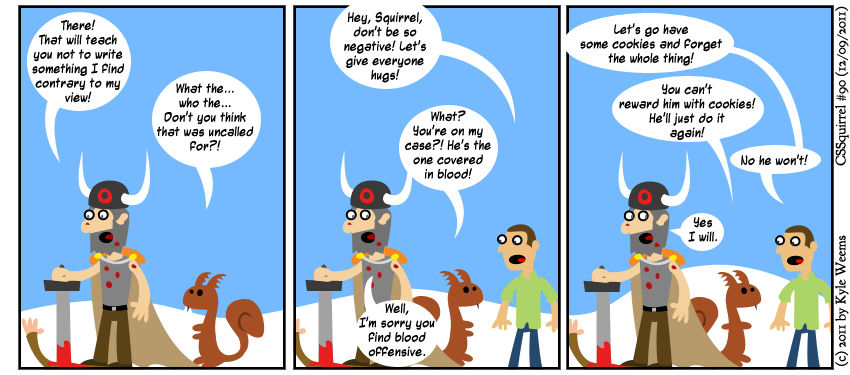Burnout, Part 1: Labor
Friday, November 20th, 2015Disclaimer: Once upon a time I worked for a web development company that no longer exists. Several years of my life and career involved that company. This comic, and some more to come, will involve parts of my life during that time, and as a result involves the actions of others that worked there. I want to state clearly: these are not meant to be posts about them. They aren’t attacks. They’re posts about me, and defining moments that impacted my life, which just happen to involve them. Humans are complex shades of grey, a mixture of good and bad decisions. I’m not trying to paint anyone as a villain. Please bear that in mind.

The reasons that CSSquirrel ground to a halt over the years are legion. Like everything in life, it came from a recipe with many ingredients. But the comic above describes the nexus of those reasons. The intentional exploitation and the lack of a *single* word of thanks, never mind remuneration, hurt. It hurt so much that I have tried and failed to write about it over a dozen times in the past two years, each time deleting it for fear of “causing drama”, while simultaneously trying to dig the burning embers out of my gut. It became a logjam, standing in the way between the part of my mind that was motivated to make comics and write blog posts, and the rest of the world.
Labor Day weekend, 2013, was the single worst experience I’d ever had as an employee. It was worse than working in a call center. It was worse than having a hamburger thrown at me by an angry customer when working in fast food. It was worse than arriving for my shift at the grocery store that was my first job only to learn that more than half of the store’s employees, including myself, were laid off without notice.
In old tweets at the time I referred to the incident as my own personal road to Damascus, and to Angular (which I first learned in that fateful project) as my personal Ananias. I wasn’t converted to the faith of a framework, mind you. This is a conversation for another time, but I’ve always had an uncomfortable tension with Angular, which seems to me to enjoy complexity for its own sake. Instead my eyes were opened onto financial conflicts of interest between myself and my employers involving my career trajectory. I was pushed into a 90 hour week for the sake of making a client project easier to sell while making a profit. Worst yet, they were hoping to have me do that for them more often.
It was the first time that I thought “Maybe these people don’t have my best interests at heart”.
That loss of faith, that loss of innocence, was never recovered. It was also the key moment where my hair literally went overnight from a largely brown mass with a few silver rogues to something strongly entering the “salt and pepper” category. And with that was lost a large portion of the joy that I experienced as a developer. The joy that comes from staring at a screen for hours as I wrote code that made cool interactions and fascinating experiences that non-coders equated to magic.
I’ve been programming since I was twelve. That’s over two decades of coding, as either a hobby, or a job, or both. Other people play Frisbee golf or carve bears out of trees with chainsaws to relieve the stress of life. I would make a video game or build a website.
And then that sense of fun was gone. It was just a job. And I had to fight for respect in that job. For my self-worth. Every moment of coding became solely an exercise in self-improvement and proving my right to be in this career.
There was no place for a comic about a squirrel, or humorous quips about browser standards, when I was in that place. I still deeply cared about web development. I cared about my career. But I didn’t have the luxury of having fun with it anymore. I’d go through the motions. Quips on Twitter. I would open Photoshop and move around shapes. I would make a note of a development in the field and say “I really need to make a comic about that.” And nothing came of it.
Time doesn’t heal all wounds. It’s a stupid saying. But it does heal some. The joy of coding, the sense of fun has rejuvenated as I’ve joined new teams, had new experiences, and even been lucky enough to travel internationally for conferences related to web development. There is a renewed sense of whimsy. And I can’t think of a better balm for this oft-harsh world than whimsy.
The truth is, I miss the squirrel. The little fuzzy guy is an avatar of excited energy that represented the frenetic, irrational excitement I have about being part of this community of developers and designers. The crazy things we can do, and the esoteric disagreements we can have trying to do them, and the amazing, life-changing people I’ve met here.
And, for reasons that never fail to amaze me, there’s others out there that seem to be missing the squirrel as well.
So, clearly when put to a vote, the answer is “A world with the squirrel is better than one without one.” Who am I to argue with that?
